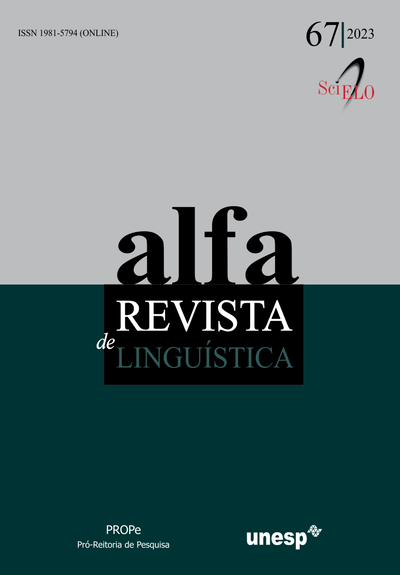O ‘nec’ estruturador discursivo do latim permaneceu como ‘nem’ em português contemporâneo
DOI:
https://doi.org/10.1590/1981-5794-e18095Palavras-chave:
negação de quantificadores nominais, quantificador universal, diacronia do latim ao português, nec (latim), nem (português)Resumo
O português hodierno não apresenta partícula negadora especializada em quantificadores nominais (D-quantificadores) (*‘Não cada cachorro late’) (Souza, 2017). Entretanto, é frequente a combinação do universal ‘todo’ com a partícula ‘nem’, derivada do Latim ‘nec’ (‘Nem todo cachorro late’). Aparentemente, ‘nem todo’ gera a negação do quantificador (¬∀). Porém, ‘nem todo’ está restrito ao fronteamento da sentença (*‘Eu não vi nem todo cachorro correr’) ou após constituintes topicalizados (‘À minha aula, nem todo aluno veio’) (Peres, 2013). Neste trabalho, conforme Gianollo (2020), ‘nem’ seguido de ‘todo’ será analisado como uma partícula estruturante do discurso. ‘Nem’ contém uma camada aditiva, sobre outra negativa. A camada aditiva liga a informação nova trazida pela sentença iniciada por ‘nem todo’ a uma informação do contexto previamente estabelecido. A camada negativa rejeita a pressuposição de maximalidade disparada pelo universal, instruindo os falantes a corrigirem suas expectativas sobre a aplicação da predicação sentencial ao domínio nominal completo quantificado por ‘todo’. O exame da distribuição de ‘nem todo’ em português brasileiro contemporâneo e sua presença do século XV ao XXI indicam que a função de ‘nec’ como partícula discursiva estruturante não se extinguiu em seus sucessores nas românicas, contra Gianollo (2020).
Downloads
Downloads
Publicado
Como Citar
Edição
Seção
Licença
Copyright (c) 2023 ALFA: Revista de Linguística

Este trabalho está licenciado sob uma licença Creative Commons Attribution 4.0 International License.
Os manuscritos aceitos e publicados são de propriedade da Alfa: Revista de Linguística. É vedada a submissão integral ou parcial do manuscrito a qualquer outro periódico. A responsabilidade do conteúdo dos artigos é exclusiva dos autores. É vedada a tradução para outro idioma sem a autorização escrita do Editor ouvida a Comissão Editorial.

